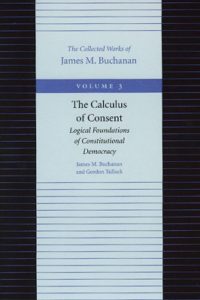Whether a right of revolution exists, whether a revolution will happen, and whether it will be successful are three different questions. The first question is a normative or moral question; the second, an economic question (see Mancur Olson’s The Logic of Collective Action); the third one, both a normative question (what are the criteria of success?) and an economic question (how does the revolution develop?).

The answer to the normative question—is there a right of revolution?—depends on one’s moral philosophy, and many were developed since homo sapiens started thinking. A right of revolution exists if one adheres to a consistent individualist philosophy where all individuals have equal value and rights. More specifically, it exists in the individualist political philosophy (perhaps the zenithal one) that underlies the work of economists James Buchanan and Gordon Tullock, as presented in their 1962 classic The Calculus of Consent: Logical Foundations of Constitutional Democracy (see also my Econlib review).
An individual right of revolution follows from the primacy of the individual over the collective, which is not to say that waging a revolution is easy nor that it will necessarily be successful. The French Revolution, for example, was rather unsuccessful by any classical-liberal criterion, except perhaps in a long-term perspective. The right of revolution is a typical belief of modernity, which Buchanan and Tullock have pushed to its logical conclusion:
The individual may choose to reject the [social] “contract” entirely; he may revert to a “state of nature”—in this case a revolt against established social order. On ethical grounds the individual must always be granted the “right” to make such a choice, but, once he has done so, the remaining members of the group have no contractual obligation to consider the revolutionary to be subject to the protections of the “contract.” (p. 261)
In his appendix to the book (each of the two authors has one), Gordon Tullock points out one important, but often neglected, corollary:
The State should not have a monopoly of force. The oriental states were “too strong for society” and we should do everything in our power to avoid a similar situation. The State should have enough power to “keep the peace” but not enough to provide temptation to ambitious men. The State should never be given enough power to prevent genuinely popular uprisings against it. … In this, as in other aspects of our construction of the constitutional implications of a consistent individualistic philosophy, the shifts in the fraction of the population approving or disapproving certain changes are not of central importance. (p. 348)
The last sentence—which captures the gist of our authors’ philosophy—means that it is not morally “of central importance” whether it is one or 75 million individuals who revolt against the state because their rights have been trampled upon. (In my opinion, though, Tullock should have written “individualist” instead of “individualistic.”) See also James Buchanan’s 2006 book Why I, Too, Am Not a Conservative (and my review in the spring 2022 issue of Regulation). Whether or how such a state is possible appears to be a crucial question of political economy.

The Declaration of Independence.

Liberty Leading the People, La Liberté guidant le peuple, painting by Eugène Delacroix commemorating the July Revolution of 1830, which toppled King Charles X.


READER COMMENTS
Thomas Lee Hutcheson
Sep 3 2022 at 10:10am
Is it possible for a state to be strong enough to keep the peace (optimally prevent citizens from harming one another — preventing some harms might not be cost effective — including negative externalities) and fend off aggression from other states, without being powerful enough to attract ambitious people (and that is good?) and to prevent popular revolutions?
Pierre Lemieux
Sep 3 2022 at 11:14am
Thomas: That indeed is the question that Buchanan raised. Anthony de Jasay, following Hume, answered negatively, which led him to anarchism, with a caveat for protection against foreign tyrants.
Craig
Sep 3 2022 at 2:59pm
I’d suggest in its original design there was some thought given to this general concept. I’d suggest it was designed where the federal government would have a smaller standing army and that the militias of the several states > standing federal army and that the several states’ militia + federal standing army > any foreign invader.
Whether that model would hold much merit today is a secondary question, but the general concept of this model had some merit to it, whenever the US was in a conflict, including the Civil War, many units were supplied by states and named after them and fought as groups of soldiers from states.
Thomas Lee Hutcheson
Sep 4 2022 at 8:33am
That was presumably the point of the Second Amendment.
Pierre Lemieux
Sep 5 2022 at 12:38pm
Thomas: This presumption is a misconception that neglects several decades of scholarship that preceded, and are summarized in, the 2007 Supreme Court’s Heller decision. All rights defined by the original Bill of Rights are individual rights. “The States” is only mentioned in the 10th Amendment, as further limiting the rights of the federal government.
Craig
Sep 5 2022 at 4:27pm
On this topic I am genuinely pro-2A as most would define the contours of the debate today. However, historically speaking, the modern debate has taken on contours that have no real historical foundation. The 2A incidentally mentions the individual right, but does not exist for purposes of defining the scope of that right. Its designed to define the scope of federal authority and in the context of firearms, there is none. Why? Because if the federal government could regulate firearms, the federal government could indirectly defang the state militias which were designed to be a check to a federal government gone wild.
Pierre Lemieux
Sep 6 2022 at 12:24am
Craig: With due respect, I don’t think Heller agrees with you and Justice Stevens (which Justice Scalia specifically rebuffs). Three quotes from the decision, just as examples:
The Second Amendment was meant to preserve an individual right guaranteed by English law and not necessarily connected with militia duty. The Supreme Court analysis is especially interesting from a historical viewpoint.
Craig
Sep 6 2022 at 8:17am
I do understand that Heller and MacDonald don’t agree with me and the issue isn’t really isn’t a 2nd Amendment issue, per se, but rather a XIV Amendment issue. I’m critical of incorporation by way of the XIV Amendment, generally, as applied to any Amendment. It leaves you in a position where the federal government, a government intended to have powers that are ‘few and defined’ winds up delving into the minutiae of life, an area that should be within the scope of the reserved powers of the states which are said to touch on topics that are ‘numerous and indefinite’
What happens when you incorporate the I Amendment against the states? Well, we take a very absolutist I Amendment and the federal judiciary starts inventing the Lemon test and things like time, place and manner regulations.
“The Second Amendment was meant to preserve an individual right guaranteed by English law and not necessarily connected with militia duty.”
The Constituion, as a whole, is about the scope of federal authority. Interestingly if the militia logic actually is employed properly, the 2A would actually ONLY protect weapons useful for military purposes, but I digress a bit here. The 2A is written in an absolute sense, and I suggest it should be taken in that sense because it defines the scope of federal authority. Its absolutist sense gives rise to the very next question which I am sure you’ve heard before which is, “Well, then would you have a right to buy a tank, F-15 or nuclear missile?”
That’s why we have states.
You see the problem is that if we take the 2A as the actual measuring stick, and even if we assumed that Congress itself never acted on the topic, we wind up in a position where, counterintuitively the federal judiciary becomes entangled in the scope of your individual right to bear arms. Deterministically you might be ok with the result of Heller and MacDonald. I am too and we’ve marched down the path of incorporation for so long I suppose there’s no turning back, but at the end of the day the XIV Amendment has brought the US to the point where cakes are federal issues!
Pierre Lemieux
Sep 6 2022 at 2:41pm
Craig: Thanks for the clarification. I had not considered the incorporation argument. As you suggest you are yourself tempted to do, I consider this as a settled matter. The 14th Amendment did prevent the states from being little Leviathans, or at least slow them down, or at least for a while; and it became Leviathan itself (see my Regulation review of Gary Gerstle’s Liberty and Coercion).
Jonathan M Murphy
Sep 4 2022 at 10:54am
I could be wrong, but my understanding is that is still the case. I believe the national guards are (in total) roughly the same size as the standing army in the US (no clue about the other branches).
Craig
Sep 5 2022 at 2:59pm
You could be right. I am not sure, but my impression today is that if you were to simply stack one against the other, ie the 50 states’ NGs against the US military, the US military would likely prevail, tactically. My impression is that the NG is supplied with second line weapons, ie at one point they had F-4s when the USAF had F-15s, or they would have M60 tanks when US military had M1s, things like that.
Of course in reality if the 50 state guards were aligned against the US military, the US military would have a problem similar to the ARVN in Vietnam where they’d have to worry about their soldiers not wanting to fight or otherwise being infiltrated. After all if all 50 states DID align against the US military one would think there would be at least some equity to their position!
Loquitur Veritatem
Sep 3 2022 at 10:55am
That statement is too general. An individual may not violate group norms with impunity. Which norms, you may ask? Let’s start with the obvious one: the prohibition of killing that isn’t in self-defense. There are many more in the same category, that is, norms which work to the advantage of all members of the group (except, obviously, the renegades who wish to violate them). In the case of unjustified killing (murder), the murderer has committed an act of rebellion against a group norm, an act for which he will be punished unless he can flee to a safe haven.
What if a norm is a religious one, like praying at certain times of the day in a group setting, where absence or obvious abstention will be noted? Repeated violations of the norm, despite warnings, would be a kind of rebellion. It might even be on a par with murder in the traditions of the group.
So, where does individual primacy start and group primacy end? With murder, with grievous bodily harm, with theft, with extra-marital sex, with non-observance of traditional rituals? It very much depends on whether you are a member of the group or an outsider who is prone to making pronouncements like the one that I quote at the top of this comment.
Pierre Lemieux
Sep 3 2022 at 11:35am
Loquitur*: Your objection is a valid one. Thanks for this contribution to the conversation. I suspect you know that it is a question that Hayek raised. He answered that the rules (what, contrary to Hayek however, you call “norms”) to be enforced by law are only those those on which the existence of the whole social order depends and which (in a free society) are not within an individual’s “protected domain.”
I don’t understand your last paragraph.
[*Assuming that this is your first name, instead of Veritatem (“pravda” in Russian), as the Chinese would do. My apologies for the pedantic mot d’esprit.]
Loquitur Veritatem
Sep 3 2022 at 11:33pm
Thank you, Professor Lemieux, for the gracious reply to my comment. I, too, didn’t understand my third paragraph when I re-read it. How about this?
Regarding Hayek’s position, I can only say that I agree with it in principle, but that still leaves me with the view that societally essential norms aren’t necessarily the same across societies. And to the extent that there are different essential norms within the United States, which is far from being one society, there is good reason to consider seriously a national divorce. It would be a more constructive move than a rebellion. The idea of rebellion attracts too many foolish hot-heads and would be a good excuse for overt suppression of all who dare dissent from “wokeism”, and leftism generally.
Regarding my nom de guerre, it translates roughly from Latin to English as “he speaks the truth”, or truth-teller. An immodest claim, I admit.
Craig
Sep 3 2022 at 2:55pm
“An individual right of revolution follows from the primacy of the individual over the collective”
In my view the natural right of revolution flows from the fundamental right of self defense.
Mactoul
Sep 3 2022 at 10:36pm
Actual revolutions, like American, French, Russian and even English revolutions of 17c were not concerned with self-defense but with political, religious or philosophical matters.
Pierre Lemieux
Sep 5 2022 at 12:18pm
Mactoul: I don’t think that’s true. American and French revolutionary leaders had read Locke. The latter also directly inspired by the former. And to say that they were only concerned with philosophical matters is saying that they were concerned with everything, including the right of self-defense. Moreover, read the Second Amendment, and note that Mirabeau proposed to include a similar right in the French Declaration of Rights of 1789. Section 2 of the latter specifically included a right of “resistance to oppression.”
Craig
Sep 5 2022 at 3:06pm
What would it take for George Washington, a leader in the French and Indian Wars, a loyal member and soldier of the British Empire, to lead a revolt against the British and to side with the, at the time, the dreaded, and Catholic, French?
If you were to say to me that there were political and economic consideration, I’d say that you are absolutely correct and we can read something like Common Sense to give us a decent sense of what those political and economic interests were.
However the DoI has its most famous clause below:
“We hold these truths to be self-evident, that all men are created equal, that they are endowed by their Creator with certain unalienable Rights, that among these are Life, Liberty and the pursuit of Happiness.–That to secure these rights, Governments are instituted among Men, deriving their just powers from the consent of the governed, –That whenever any Form of Government becomes destructive of these ends, it is the Right of the People to alter or to abolish it, and to institute new Government, laying its foundation on such principles and organizing its powers in such form, as to them shall seem most likely to effect their Safety and Happiness. Prudence, indeed, will dictate that Governments long established should not be changed for light and transient causes; and accordingly all experience hath shewn, that mankind are more disposed to suffer, while evils are sufferable, than to right themselves by abolishing the forms to which they are accustomed. But when a long train of abuses and usurpations, pursuing invariably the same Object evinces a design to reduce them under absolute Despotism, it is their right, it is their duty, to throw off such Government, and to provide new Guards for their future security.”
The justification is a broad sense of self-defense….
Mactoul
Sep 3 2022 at 10:31pm
I wonder if it is possible to name a single actual revolutionary that held anything approximating the zenithal individualism.
Pierre Lemieux
Sep 5 2022 at 12:07pm
Mactoul: Probably not. Who participates in a revolution depends on who has the incentive to do so, which raises the standard problem of collective action (even if everybody wants a revolution, who will risk his life to start or lead it?). The leadership of a revolution will also tend to attract the worst luminaries, the craziest, and the most cruel (the end justifies the means).
Moreover, most past revolutionaries did not have an individualist ideologies at all. They had not read Buchanan and Tullock and, alas, did not have an EconLog to follow.
David Seltzer
Sep 4 2022 at 6:38pm
Pierre: Please read Kevin Corcoran’s Why Raw Milk Matters in today’s EconLog post. The normative question as to revolution by one person or 75 million is because an individual has property and sovereignty in their person. When that sovereignty is violated by the state, it becomes a matter of self-defense for whom, as you state, has primacy over the collective. That revolution can take many forms.
Jose Pablo
Sep 5 2022 at 6:15pm
“A right of revolution exists if one adheres to a consistent individualist philosophy where all individuals have equal value and rights.”
But not only “if one adheres to …”. A right of revolution can exist as a positive right if one adopts a utilitarian perspective. Under this framework, the utility created and destroyed by the revolution could be worked out following a positive discussion (certainly if requires to be a utilitarian).
Pierre Lemieux
Sep 6 2022 at 11:35am
Jose: You are right: my argument there claims that “a consistent individualist philosophy where all individuals have equal value and rights” is a sufficient, but not necessary, condition for “a right of revolution to exist.” And this is indeed what I meant.
I don’t think utilitarianism is also a sufficient condition and certainly not a sufficient condition for an individual right of revolution. In utilitarianism, an individual preferences are weighed against (compared with) the preferences of all other individuals, in some mysterious way. In the Buchanan-Tullock perspective, an individual has a veto against all.
Jose Pablo
Sep 6 2022 at 1:15pm
Yes, you are right a utilitarian perspective does not provide an “individual right” to revolution. The right to revolution would pertain to the “we” (the “mysterious we”).
But that seems to be the “collective right to revolution” invoked in the Declaration of Independence:
When in the Course of human events, it becomes necessary for one people to dissolve the political bands which have connected them with another, and to assume among the powers of the earth,
… does not look like invoking an individual right, right?
Prudence, indeed, will dictate that Governments long established should not be changed for light and transient causes; and accordingly all experience hath shewn, that mankind are more disposed to suffer, while evils are sufferable, than to right themselves by abolishing the forms to which they are accustomed. But when a long train of abuses and usurpations, pursuing invariably the same Object …
And this very much seems to me like some kind of utilitarian consideration.
Pierre Lemieux
Sep 6 2022 at 2:09pm
Jose: Yes, it does look collectivist. But in his book Our Republican Constitution, Randy Barnett argues that the original meaning of “we the people” in the U.S. Constitution was “We the People as individuals” (pp. 72, 63–81). As I mentioned to you in a previous conversation, Barnet claims that it is only “the rise of progressivism in both political parties that led to an assault on our Republican Constitution” and to the 20th-century victory of the collective concept of “the people.” I don’t know enough to take a strong stance on the historical issue.
Mactoul
Sep 6 2022 at 9:18pm
Frankly your argument is bizarre.
Republic means the public thing. It is inseparable from the concept of The People. The entire idea that classic liberalism is essentially equal to 20c libertarianism is untenable.
Whitehall
Sep 7 2022 at 2:55am
We’re seeing an individualistic revolution in China today with the “lie flat” movement, if it can be called that and not just a fad. There do seem to be incentives and disincentives in the system to provoke that.
Does the Communist Chinese Party have a duty to whip these yung-ens into shape and coerce them back into the labor force?
Likewise, we’ve long held that marijuana smokers in the US tend to being slackers, not working very hard and “living off the fat of this great land.” The hard working resent that behavior which I argue is one basis for marijuana prohibitions in the past, although there are other arguments too.
Comments are closed.